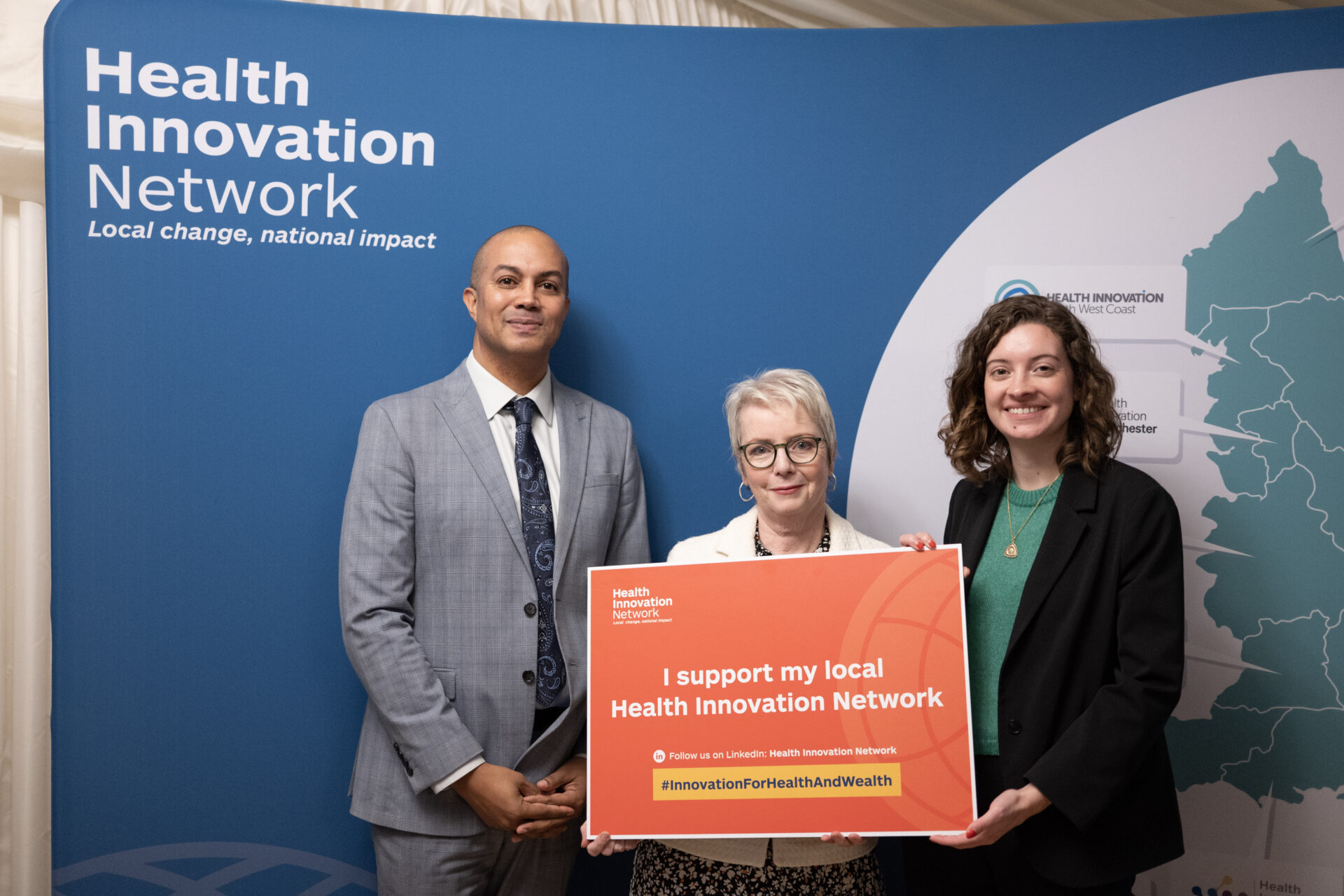You can find out more here about the collective impact of this work and how a focus on patient safety can not only reduce avoidable harm, but can also reduce demand and improve NHS productivity.

Laura Rooney
Health Innovation Manchester is currently working on an Innovate UK funded ‘Health Innovation Accelerator’ – a £15m programme established to rapidly improve the diagnosis and treatment of disease across the 2.8m Greater Manchester population.
Laura Rooney, Director of Strategy at Health Innovation Manchester, said: “The health innovation accelerator programme will develop a step-change in the development and deployment of novel diagnostics in GM, targeted towards the needs of local people. It will add value to academic research and sector strengths and leverage existing data assets to transform patient care, unlock new market opportunities for businesses, and strengthen GM’s position as a world-leading centre for health innovation.”
At Health Innovation East, enabling the embedding of the Patient Safety Incident Response framework (PSIRF) across the region has led to the facilitation of first-of-kind opportunities for the region’s health and care professionals to co design their organisational responses to patient safety together.
Sarah Hamilton, Senior Improvement Lead at Health Innovation East, said: “We established the regional approach using systems thinking, connecting colleagues via innovative, collaborative webinars, and delivering in person workshops to help develop a shared understanding around implementing the national PSIRF guidance. Further, our team co-ordinated regular regional meetings for leaders from ICSs in our region to celebrate successes and offer each other advice on overcoming the challenges of system transformation. Connecting expertise, accelerating understanding, and delivering frameworks around which they can operate has led to timely implementation and successful transformation for PSIRF in the region. This has now moved into seeking to learn and improve from patient safety incidents, building bridges to quality improvement and innovation. One lens for this is learning from incidents is around pressure ulcers in the early stages, bringing together patient safety partners, patient safety specialists, tissue viability clinicians, improvement and innovation leads reviewing a whole system approach to streamline and modernise practice to improve early intervention with pressure ulcers.”

Alex Leach
Health Innovation West of England worked with North Bristol NHS Trust (NBT) to assess the benefits for patients and staff of a cardiac monitoring solution that is seen as a technological advancement from traditional electrocardiogram (ECG) Holter monitoring systems. The evaluation of NBT’s implementation of iRhythm’s Zio device shows it has successfully improved system efficiencies by increasing the number of patients completing the diagnostic pathway, decreasing waiting times for monitoring and identifying cardiac arrhythmias that otherwise would have been missed.
Alex Leach, Deputy Director of Programmes at Health Innovation West of England, said: “We’ve been really pleased to support North Bristol Trust with the evaluation of the Zio Cardiac Patch technology which showed really positive improvements in terms of more rapid diagnosis of potentially life-threatening cardiac conditions, with other benefits shown including waiting list reduction and improved staff optimisation. The Trust has continued to utilise this technology and we believe there is a strong case for wider use across other cardiac services.”

Richard McBain
Using the National Wound Care Strategy Programme (NWCSP) recommendations, Health Innovation East Midlands has worked with the Lincolnshire Community Health Services (LCHS) team to transform the pathway for patients with lower limb wounds.
Richard McBain, Senior Improvement Lead at Health Innovation East Midlands, said: “As part of the new Transforming Wound Care pathway, each patient receives a 90 minute assessment from a Tissue Viability Nurse that includes a Doppler test that looks at blood flow to the wound. The results of this test help the clinicians to diagnose the type of wound and optimise treatment. This initial test at the start of the new pathway has helped the team to heal almost 20% of patients within 12 weeks of assessment and help patients get more mobile. By implementing the programme the team have saved up to 240 hours of clinical time, a huge amount for such a small team. This in turn, frees up staff to assess and treat new patients earlier than they previously would have been able to, further increasing the opportunities for the wounds to heal more quickly.”
Ashford and St Peter’s Hospital (ASPH) established a specialist Preterm Birth (PTB) clinic in 2018, significantly reducing the PTB rate, now among the lowest in the country. The Health Innovation Kent Surrey Sussex Patient Safety Collaborative is working with the team to ensure the innovative work is shared Regionally and Nationally to help reduce variation and support a standardised approach to care. You can read more here.
Ursula Clarke, Associate Director Patient Safety, Health Innovation Kent Surrey Sussex, said: “Our Patient Safety Team work by facilitating unhurried and unfiltered conversations that can witness remarkable breakthroughs and lasting change. One example we are very proud of is, alongside Ashford and St. Peter’s Hospitals NHS Foundation Trust, we have been shortlisted for the Patient Safety Award at the HSJ Awards 2024 for our project “Reducing Preterm Birth: a success story. This project worked to improve diagnosis and delay premature births which has ensured improved outcomes and built confidence in our Maternity services.”

Anna Wykes
Health Innovation Wessex (HIW) collaborated with the Dorset ICS Cancer Programme and Wessex Cancer Alliance, to improve colorectal cancer outcomes, especially in communities with higher social deprivation who often saw poorer outcomes. The focus was on increasing the use of the NICE-approved faecal immunochemical test (FIT) for earlier detection of colorectal cancer, the fourth most common cancer. Through survey research with the Dorset public, to understand their awareness and experiences with FIT, it was possible to identify interventions that could boost test uptake. At the centre of this work was the focus on working with patient groups less likely to complete the tests. Anna Wykes, Programme Manager for Cancer Care, Health Innovation Wessex, said: “This project is a great example of the power public engagement can have on influencing how we make diagnostic tests more accessible.”

Jodie Mazur
Health Innovation West Midlands is supporting several healthcare organisations who have highlighted interest in trialling point of care ultrasound scanning (POCUS) in their clinical areas, including the Birmingham Children’s Haemophilia (BCH) team. Point of care ultrasound scanning is a procedure commonly used at the patient’s bedside, often within acute medicine, to aid assessment and management of patients. As ultrasound technology has advanced, POCUS enables healthcare staff to use a handheld probe connected to a tablet or smartphone to support diagnosis decision-making.
Jodie Mazur, Associate Director of Implementation and Improvement, said: “At Health Innovation West Midlands we use human factors and quality improvement approaches to really understand how innovations can be successfully adopted into diagnostic pathways, identifying and addressing enablers and barriers before widespread adoption.”
Through DigitalHealth.London, Health Innovation Network South London is supporting a number of companies with innovations to improve diagnosis for patients, including Mendelian who’s software solution (MendelScan) supports earlier diagnosis of rare diseases – the first tool that addresses rare diseases as a whole and integrates diagnosis into a healthcare system. Using MendelScan, plus a team of international rare disease experts, they support doctors to refer patients to the right specialist, enabling faster diagnosis and treatment.
Dr Peter Fish, CEO of Mendelian, said: “Our technology connects the dots of patient health records, uncovering hidden patterns that may indicate undiagnosed rare diseases. This empowers clinicians to make informed clinical decisions at a scale previously unimaginable, leading to earlier, more accurate care. Ultimately, we aim to improve patient outcomes and optimise NHS resource utilisation through timely intervention.”
Health Innovation North West Coast has worked with the integrated care systems in Cheshire and Merseyside and Lancashire and South Cumbria on the National Medicines Safety Improvement Programme (MedSIP), to support them in developing a ‘whole-system’ approach to the challenge of high-risk opioid prescribing for chronic non-cancer pain. Opioids are very good pain relief for acute pain and for pain at the end of life when used with care. However, in the case of chronic non-cancer pain, when the source of long-term pain does not have a cause that can be treated, they can do more harm than good, particularly when used long term and at higher doses. You can find out more about the local project here.

Join us on 11 and 12 June in Manchester to find out how the Health Innovation Network is improving health and driving wealth through health innovation. This year we’ll be joined on our stand by 18 Network-supported innovators, showcasing innovations which are helping to deliver the Government’s three shifts for the NHS and solve some [...]

The Health Innovation Network is delighted to announce the launch of Innovation Insights, a brand-new webinar series designed to highlight the latest in health innovation, offering attendees valuable insights into the adoption and spread of innovation within the health and care landscape. Each interactive webinar will feature: Expert presentations: Delivered by thought leaders across [...]

The Health Innovation Network, at an event sponsored by Sarah Coombes MP, brought together parliamentarians including Health Minister Karin Smyth MP and Chair of the Science, Innovation and Technology Committee, Chi Onwurah MP to meet with six innovators supported by health innovation networks across the country and their NHS partners. At the Meet the Innovators: [...]






